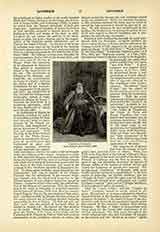

Lauzon, JEAN BE, fourth governor of Canada, b. at Paris, 1583; d. there, February 16, 1666. He was the son of Francois de Lauzon and Isabelle Lotin. In 1613 he was councillor of the Parlement of Paris; master of petitions (1623); appointed by Cardinal Richelieu Intendant of the Company of New France, he was lauded by Champlain for obtaining the restoration of Quebec taken by the Kertk brothers (1629). Lauzon’s position enabled him to secure for his sons immense domains in Canada, including the seigniories of Lauzon (opposite Quebec), de la Citiere, with sixty leagues of frontage on the right shore of the St. Lawrence, and the Island of Montreal, later ceded to La
Dauversiere, one of the founders of Ville Marie. His important office and services merited him a good reception as governor (1651). Times were critical. Lauzon, scholar, able magistrate and financier, organized the regular administration of civil and criminal justice, and provided, from the fur trade at Tadoussac, for the civil and military list, besides furnishing pensions for the Jesuits, Ursulines, and hospital-nuns. But unused to war and already aged, he could not subdue the Iroquois, whose audacious cruelty made several victims under the walls of Quebec. Although his eldest son, Jean, destined like Dollard to an heroic death, represented him wherever danger threatened, Lauzon resigned before the expiration of a second term of office (1656), leaving the government ad interim to a younger son, Charles de Lauzon-Charny. Lauzon is credited for his probity, virtue, exemplary life, and great zeal for God‘s interests and the conversion of savages; but he lacked experience, decision under trials, and had assumed the direction of the colony under too adverse circumstances.
LIONEL LINDSAY

